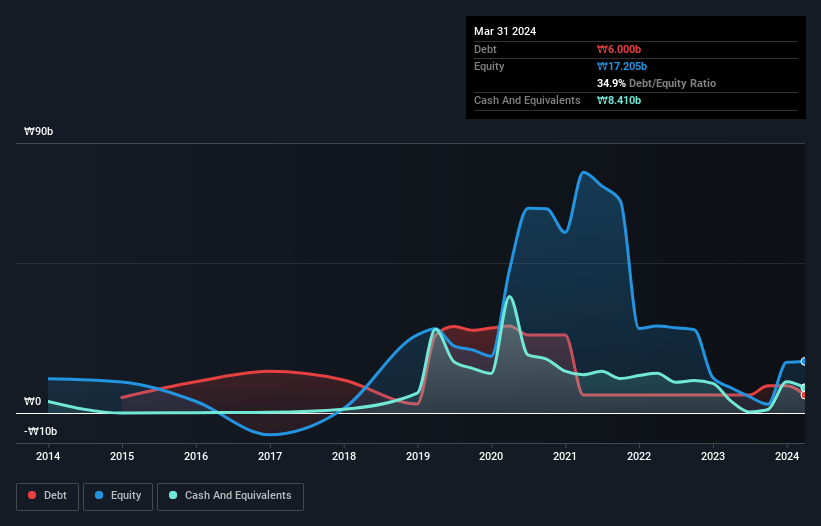- South Korea
- /
- Chemicals
- /
- KOSDAQ:A294140
LEMON (KOSDAQ:294140) Has Debt But No Earnings; Should You Worry?
Howard Marks put it nicely when he said that, rather than worrying about share price volatility, 'The possibility of permanent loss is the risk I worry about... and every practical investor I know worries about.' So it might be obvious that you need to consider debt, when you think about how risky any given stock is, because too much debt can sink a company. As with many other companies LEMON Co., Ltd. (KOSDAQ:294140) makes use of debt. But the more important question is: how much risk is that debt creating?
What Risk Does Debt Bring?
Debt is a tool to help businesses grow, but if a business is incapable of paying off its lenders, then it exists at their mercy. In the worst case scenario, a company can go bankrupt if it cannot pay its creditors. However, a more common (but still painful) scenario is that it has to raise new equity capital at a low price, thus permanently diluting shareholders. Of course, plenty of companies use debt to fund growth, without any negative consequences. When we examine debt levels, we first consider both cash and debt levels, together.
See our latest analysis for LEMON
What Is LEMON's Net Debt?
As you can see below, LEMON had ₩6.00b of debt, at March 2024, which is about the same as the year before. You can click the chart for greater detail. But it also has ₩8.41b in cash to offset that, meaning it has ₩2.41b net cash.

How Healthy Is LEMON's Balance Sheet?
According to the balance sheet data, LEMON had liabilities of ₩7.95b due within 12 months, but no longer term liabilities. On the other hand, it had cash of ₩8.41b and ₩2.06b worth of receivables due within a year. So it can boast ₩2.52b more liquid assets than total liabilities.
This short term liquidity is a sign that LEMON could probably pay off its debt with ease, as its balance sheet is far from stretched. Succinctly put, LEMON boasts net cash, so it's fair to say it does not have a heavy debt load! When analysing debt levels, the balance sheet is the obvious place to start. But you can't view debt in total isolation; since LEMON will need earnings to service that debt. So if you're keen to discover more about its earnings, it might be worth checking out this graph of its long term earnings trend.
Over 12 months, LEMON made a loss at the EBIT level, and saw its revenue drop to ₩11b, which is a fall of 59%. To be frank that doesn't bode well.
So How Risky Is LEMON?
Statistically speaking companies that lose money are riskier than those that make money. And we do note that LEMON had an earnings before interest and tax (EBIT) loss, over the last year. Indeed, in that time it burnt through ₩11b of cash and made a loss of ₩5.5b. Given it only has net cash of ₩2.41b, the company may need to raise more capital if it doesn't reach break-even soon. Even though its balance sheet seems sufficiently liquid, debt always makes us a little nervous if a company doesn't produce free cash flow regularly. The balance sheet is clearly the area to focus on when you are analysing debt. However, not all investment risk resides within the balance sheet - far from it. These risks can be hard to spot. Every company has them, and we've spotted 5 warning signs for LEMON (of which 3 are concerning!) you should know about.
If you're interested in investing in businesses that can grow profits without the burden of debt, then check out this free list of growing businesses that have net cash on the balance sheet.
New: AI Stock Screener & Alerts
Our new AI Stock Screener scans the market every day to uncover opportunities.
• Dividend Powerhouses (3%+ Yield)
• Undervalued Small Caps with Insider Buying
• High growth Tech and AI Companies
Or build your own from over 50 metrics.
Have feedback on this article? Concerned about the content? Get in touch with us directly. Alternatively, email editorial-team (at) simplywallst.com.
This article by Simply Wall St is general in nature. We provide commentary based on historical data and analyst forecasts only using an unbiased methodology and our articles are not intended to be financial advice. It does not constitute a recommendation to buy or sell any stock, and does not take account of your objectives, or your financial situation. We aim to bring you long-term focused analysis driven by fundamental data. Note that our analysis may not factor in the latest price-sensitive company announcements or qualitative material. Simply Wall St has no position in any stocks mentioned.
Have feedback on this article? Concerned about the content? Get in touch with us directly. Alternatively, email editorial-team@simplywallst.com
About KOSDAQ:A294140
Slight risk with worrying balance sheet.
Market Insights
Community Narratives




